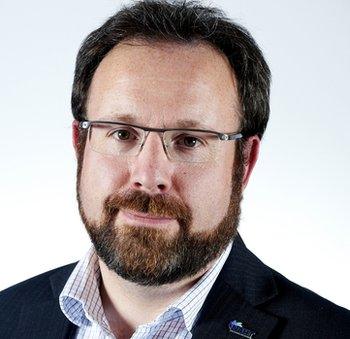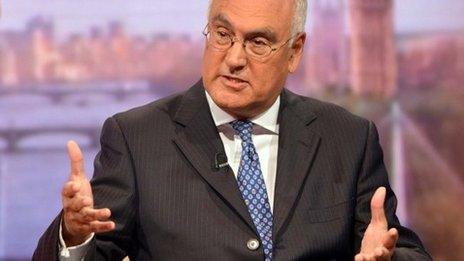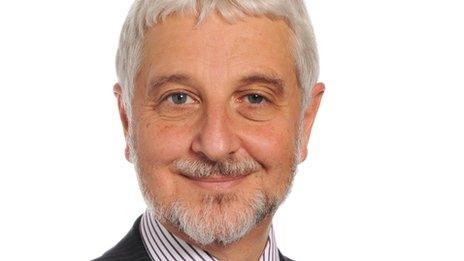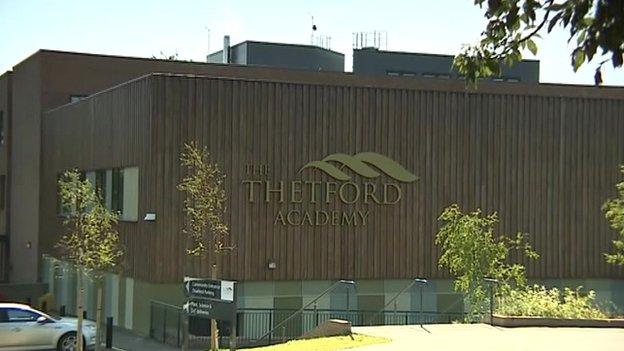Heads call for transformation of Ofsted
- Published

The NAHT says the current model of inspection holds the education system back
Schools in England can no longer work with Ofsted's "adversarial approach" and the watchdog should be totally transformed, head teachers have warned.
The National Association of Head Teachers (NAHT) says school inspections should be changed to make them fairer and more accountable.
The NAHT wants to see peer reviews, where school leaders lead rigorous and accredited reviews of other schools.
Ofsted boss Sir Michael Wilshaw said schools needed "go-getting" leaders.
The NAHT's plea comes as Ofsted launches a consultation on the future of school and college inspections.
The chief inspector, Sir Michael Wilshaw, is due to give details of the consultation process - to which members of the public will be invited to respond.
'Unnecessary bureaucracy'
Ahead of those details being revealed, NAHT general secretary Russell Hobby said: "Ofsted's legitimacy hangs in the balance.
"Schools can no longer learn effectively from its adversarial approach. The current model of inspection has reached the end of its useful life and now holds the education system back.

Mr Hobby says schools are "investigated, not inspected"
"The regime stifles innovation, provokes unnecessary bureaucracy and damages recruitment. Small changes will not be enough - we desperately need a brand new approach to emerge from the consultation.
"Inspection only has a future if it can work with schools to help them improve."
Mr Hobby said currently schools were "investigated, not inspected" and that school leaders were expected to prove there was "no wrongdoing, not to showcase excellence".
He said the recent trend of no-notice inspections had to stop.
"Head teachers have a right and a need to be present during inspection, and a small amount of notice is required to make this possible."
Mr Hobby said the NAHT would like to see a system of peer review, where school leaders led rigorous and accredited reviews of other schools.
Ofsted should be limited to intervening in cases of failure and to moderating these peer judgements, he said.
"Ofsted has expanded its remit relentlessly," Mr Hobby said.
"It does not see itself as just an inspector of standards, it is seeking to set policy, which is a task that should be reserved for elected officials.
"When we look back on this era, we will see that, far from delegating authority to schools, government has only delegated it to Ofsted.
"This massive, unwelcome and antagonistic over-reach creates a strong case for a complete rethink."
The NAHT is urging all political parties to make a general election pledge to reform the watchdog.
'Energetic' heads
Ofsted chief Sir Michael Wilshaw said the government was looking to ambitious and "buccaneering" heads to lead school improvement.
"It very much chimes with my own conviction that the future of education in this country depends on these energetic, dynamic, entrepreneurial, and perhaps slightly maverick leaders who thrive on competition and aren't afraid to ruffle feathers," he said.

Sir Michael wants to see frequent but shorter inspections of good schools
Sir Michael's comments came in a speech to Norfolk's annual head teacher conference on Wednesday.
He told the conference that schools had responded positively to Ofsted's move to toughen up inspections - including a decision to replace the "satisfactory" rating with "requires improvement".
"I am the first to recognise that Ofsted needs to move towards a more proportionate, risk-based model for inspection which focuses on those struggling institutions that need a greater level of scrutiny and intervention.," Sir Michael said.
"At the same time, we need to move to a new inspection model which keeps a more watchful eye on good schools so that they don't slip back but continue to improve.
"That is why, when we launch our consultation tomorrow [Thursday], I will be suggesting frequent but shorter inspections of good schools led by HMI [Her Majesty's Inspectorate], with a much greater emphasis on professional dialogue."
- Published16 September 2014

- Published23 September 2014
